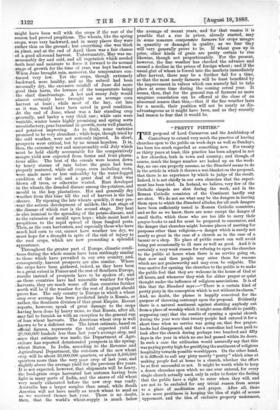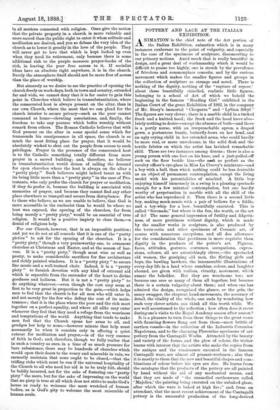"PRETTY PIETIES." T HE proposal of Lord Carnarvon and the Archbishop
of Canterbury to extend very much the practice of leaving churches open to the public on week-days as well as Sundays, has been too much regarded as something new. For twenty or thirty years at least, this practice has been adopted in not a few churches, both in town and country; and though, ef course, Much the larger number are locked up on the week- day, no one can properly assume, as the Standard seems to do in the article in which it throws a wet-blanket on the proposal, that there is no experience by which to judge of the result. Indeed, it is not chiefly in our own churches that the experi- ment has been tried. In Ireland, we believe, very few of the Catholic chapels are shut during the week, and in the Roman Catholic countries of the Continent hardly any are shut. We do not see what may be the dangers in leaving them open to which the Standard alludes, for"all such dangers have been sufficiently tested in Roman Catholic countries ; and so far as we know, there are none except the danger of small thefts, 'which those who are too idle to carry their prayer-books to and fro must be prepared to encounter, and the danger that churches might become places of meeting for purposes other than religious,—a danger which is surely not nearly so great in the case of a church as in the case of a bazaar or a shop. No place of public resort can well avoid being put occasionally to ill uses as well as good. And it is certainly a very weak reason for refusing to open the churches to the public at hours when there is no service going on, that now and then people may enter them for reasons which are not praiseworthy and may even be culpable. The true motive for opening the churches to the public is to make the public feel that they are welcome in the house of God at all hours, and whenever they wish for either prayer or quiet thought under the influence of religious associations. It is of this that the Standard says :—" There is a certain kind of pretty piety in the conception which is not without its charm." And, no doubt, the phrase is happily conceived for the purpose of throwing contempt upon the proposal. Evidently there is a natural sentiment against shutting anybody out from a place of worship which it might seem difficult to justify, supposing (say) that the results of opening a special church during the year were that twenty people had entered it for-a short time when no service was going on, that five prayer- books had disappeared, and that a custodian had been paid to look after the church during perhaps two hundred and fifty days in the year in which no one had passed within its doors. In such a case the utilitarian would assuredly say that this was paying pretty high for gratifying the sentiment of religious hospitality towards possible worshippers. On the other hand,
it is difficult to call any piety merely " pretty " which aims at making people feel at home in a church, whether the effort be at first successful or not. It might be worth while to keep a dozen churches open which no one ever entered, for every single church actually used, only in order to foster the feeling that the public have a right to enter when they will, and are not to be excluded for any trivial reason from access to a place of meditation and prayer. After all, there is no mere prettiness in keeping the idea of right of access uppermoit, and the idea of exclusive property undermost, in all matters connected with religion. Once give the notion that the private property in a church is more valuable and more sacred than the public right to enter it whe,i solitude and meditation are desired, and you so debase the very idea of the church as to lower it greatly in the love of the people. They will .never get to love that which is kept locked up even when they need its retirement, only because there is some Eulditional risk to the purple morocco prayer-books of the rich, in leaving the poor free access to it. If socialist ideas have an absolute right anywhere, it is in. the church. Surely the atmosphere itself should not be more free of access than the place of worship,.
But sincerely as we desire to see the practice of opening the church freely on week-days, both in-town and country, extended far and wide, we cannot deny that it is far easier to gain this point in Churches which believe in transubstantiation, where the consecrated host is always present on the altar, than in our own Church, where the most that we can plead for the church interior is secure privacy—such as the poor cannot command at home—elevating associations, and, finally, the freedom to take any posture which befits worship without remark from others. The Roman Catholic believes that with God present on the altar in some special sense which far transcends his omnipresence in all space, the church is so much the most fitting place for prayer, that it would be absolutely wicked to shut out the people from access to such privileges. Prayer in the presence of the consecrated host is to the Catholic something totally different from mere prayer in a sacred building; and, therefore, no believer in transubstantiation would dream of calling the demand for open churches where the host is always on the altar a "pretty piety." Such believers might indeed taunt us with its being little more than a "pretty piety' in the case of Pro- testants, who only prefer the church for prayer or meditation, if they do prefer it, because the building is associated with memories of prayer, and because they cannot find any other place elsewhere so tranquil and secure from disturbance. For to those who believe, as we are unable to believe, that God is more accessible in the eucharist than he would be where no host was exposed, the opening of the churches, far. from being merely a "pretty piety," would be an essential of true religion. It would be a positive impiety to close them,—a denial of religious help.
Ivor our Church, however, that is an impossible position; and yet we do not at all concede that it is one of the "pretty pieties" to ask for the opening of the churches. It is a "pretty piety," though a very praiseworthy one, to ornament churches at Christmas and Easter, and at the season of har- vest. It is a "pretty piety," though most wise as well as pretty, to make considerable sacrifices for fine architecture and richly painted windows. It is a "pretty piety" to secure fine music and a well-trained choir. Indeed, it is a "pretty piety" to furnish devotion with any kind of external aid which is separable from the surrender of the heart to divine goodness and holiness. But it is not a "pretty piety" to do anything whatever,—even though the cost may seem at first to be very great in proportion to the gain,—which helps men to feel that the church is for all men who will enter it, and not merely for the few who defray the cost of its main- tenance; that it is the place where the poor and the rich meet together on a perfect equality, and where all alike may enter whenever they feel that they need a refuge from the weariness and temptations of the world. Anything that tends to make men feel that the Church opens her arms to all, and grudges her help to none,—however minute that help must necessarily be when it consists only in offering a quiet retreat for meditation and prayer,—is of the very essence of faith in God ; and, therefore, though we fully realise that in such a country as ours, in a time of so Much pressure for bare subsistence, there may be hundreds of churches which would open their doors to the weary and miserable in vain, we earnestly maintain that none ought to be closed,—that the trifling risks which must be run if the universal hospitality of the Church to all who need her aid is to be truly felt, should be boldly incurred, not for the sake of fostering one "pretty piety" the more, but for the sake of impressing on the world that no piety is true at all which does not strive to make God's house as ready to welcome the most wretched of human bodies, as is God's pity to welcome the most miserable of human souls.



































 Previous page
Previous page